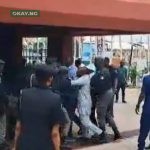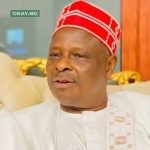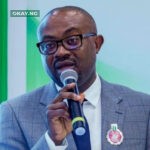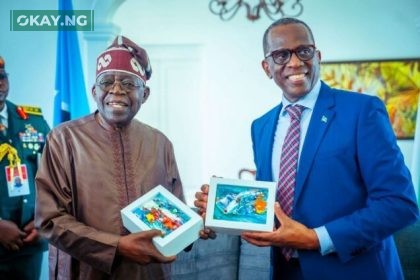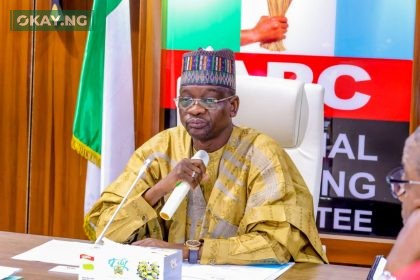A response to the Oba of Lagos over his threat to Igbos from award winning writer, Chimamanda Adichie. Chimamanda says the Oba’s words are quite disturbing. Read below…
A few days ago, the Oba of Lagos threatened Igbo leaders. If they did not vote for his governorship candidate in Lagos, he said, they would be thrown into the lagoon. His entire speech was a flagrant performance of disregard. His words said, in effect: I think so little of you that I don’t have to cajole you but will just threaten you and, by the way, your safety in Lagos is not assured, it is negotiable.
There have been condemnations of the Oba’s words. Sadly, many of the condemnations from non-Igbo people have come with the ugly impatience of expressions like ‘move on,’ and ‘don’t be over-emotional’ and ‘calm down.’ These take away the power, even the sincerity, of the condemnations. It is highhanded and offensive to tell an aggrieved person how to feel, or how quickly to forgive, just as an apology becomes a non-apology when it comes with ‘now get over it.’
Other condemnations of the Oba’s words have been couched in dismissive or diminishing language such as ‘The Oba can’t really do anything, he isn’t actually going to kill anyone. He was joking. He was just being a loudmouth.’
Or – the basest yet – ‘we are all prejudiced.’ It is dishonest to respond to a specific act of prejudice by ignoring that act and instead stressing the generic and the general. It is similar to responding to a specific crime by saying ‘we are all capable of crime.’ Indeed we are. But responses such as these are diversionary tactics. They dismiss the specific act, diminish its importance, and ultimately aim at silencing the legitimate fears of people.
We are indeed all prejudiced, but that is not an appropriate response to an issue this serious. The Oba is not an ordinary citizen. He is a traditional ruler in a part of a country where traditional rulers command considerable influence – the reluctance on the part of many to directly chastise the Oba speaks to his power. The Oba’s words matter. He is not a singular voice; he represents traditional authority. The Oba’s words matter because they are enough to incite violence in a political setting already fraught with uncertainty. The Oba’s words matter even more in the event that Ambode loses the governorship election, because it would then be easy to scapegoat Igbo people and hold them punishable.
Nigerians who consider themselves enlightened might dismiss the Oba’s words as illogical. But the scapegoating of groups – which has a long history all over the world – has never been about logic. The Oba’s words matter because they bring worrying echoes of the early 1960s in Nigeria, when Igbo people were scapegoated for political reasons. Chinua Achebe, when he finally accepted that Lagos, the city he called home, was unsafe for him because he was Igbo, saw crowds at the motor park taunting Igbo people as they boarded buses: ‘Go, Igbo, go so that garri will be cheaper in Lagos!’
Of course Igbo people were not responsible for the cost of garri. But they were perceived as people who were responsible for a coup and who were ‘taking over’ and who, consequently, could be held responsible for everything bad.
Any group of people would understandably be troubled by a threat such as the Oba’s, but the Igbo, because of their history in Nigeria, have been particularly troubled. And it is a recent history. There are people alive today who were publicly attacked in cosmopolitan Lagos in the 1960s because they were Igbo. Even people who were merely light-skinned were at risk of violence in Lagos markets, because to be light-skinned was to be mistaken for Igbo.
Almost every Nigerian ethnic group has a grouse of some sort with the Nigerian state. The Nigerian state has, by turns, been violent, unfair, neglectful, of different parts of the country. Almost every ethnic group has derogatory stereotypes attached to it by other ethnic groups.
But it is disingenuous to suggest that the experience of every ethnic group has been the same. Anti-Igbo violence began under the British colonial government, with complex roots and manifestations. But the end result is a certain psychic difference in the relationship of Igbo people to the Nigerian state. To be Igbo in Nigeria is constantly to be suspect; your national patriotism is never taken as the norm, you are continually expected to prove it.
All groups are conditioned by their specific histories. Perhaps another ethnic group would have reacted with less concern to the Oba’s threat, because that ethnic group would not be conditioned by a history of being targets of violence, as the Igbo have been.
Many responses to the Oba’s threat have mentioned the ‘welcoming’ nature of Lagos, and have made comparisons between Lagos and southeastern towns like Onitsha. It is valid to debate the ethnic diversity of different parts of Nigeria, to compare, for example, Ibadan and Enugu, Ado-Ekiti and Aba, and to debate who moves where, and who feels comfortable living where and why that is. But it is odd to pretend that Lagos is like any other city in Nigeria. It is not. The political history of Lagos and its development as the first national capital set it apart. Lagos is Nigeria’s metropolis. There are ethnic Igbo people whose entire lives have been spent in Lagos, who have little or no ties to the southeast, who speak Yoruba better than Igbo. Should they, too, be reminded to be ‘grateful’ each time an election draws near?
No law-abiding Nigerian should be expected to show gratitude for living peacefully in any part of Nigeria. Landlords in Lagos should not, as still happens too often, be able to refuse to rent their property to Igbo people.
The Oba’s words were disturbing, but its context is even more disturbing:
The anti-Igbo rhetoric that has been part of the political discourse since the presidential election results. Accusatory and derogatory language – using words like ‘brainwashed,’ ‘tribalistic voting’ – has been used to describe President Jonathan’s overwhelming win in the southeast. All democracies have regions that vote in large numbers for one side, and even though parts of Northern Nigeria showed voting patterns similar to the Southeast, the opprobrium has been reserved for the Southeast.
But the rhetoric is about more than mere voting. It is really about citizenship. To be so entitled as to question the legitimacy of a people’s choice in a democratic election is not only a sign of disrespect but is also a questioning of the full citizenship of those people.
What does it mean to be a Nigerian citizen?
When Igbo people are urged to be ‘grateful’ for being in Lagos, do they somehow have less of a right as citizens to live where they live? Every Nigerian should be able to live in any part of Nigeria. The only expectation for a Nigerian citizen living in any part of Nigeria is to be law-abiding. Not to be ‘grateful.’ Not to be expected to pay back some sort of unspoken favour by toeing a particular political line. Nigerian citizens can vote for whomever they choose, and should never be expected to justify or apologize for their choice.
Only by feeling a collective sense of ownership of Nigeria can we start to forge a nation. A nation is an idea. Nigeria is still in progress. To make this a nation, we must collectively agree on what citizenship means: all Nigerians must matter equally.





